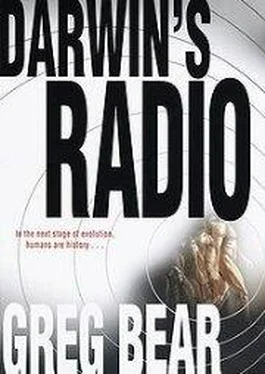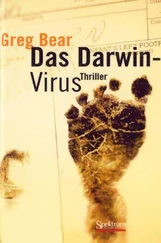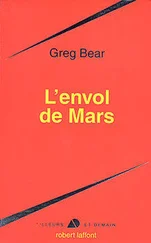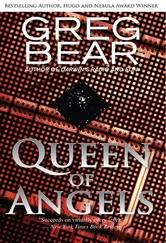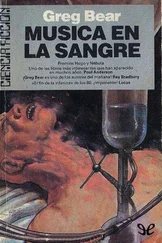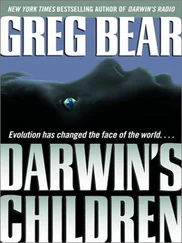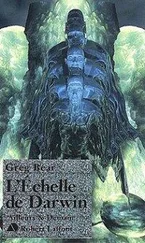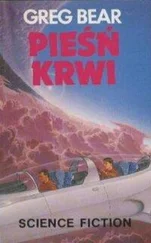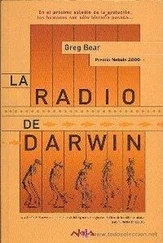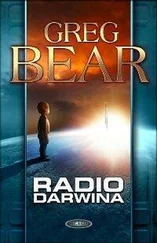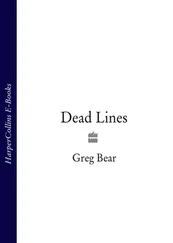Mitch pinched the bridge of his nose. “Lord,” he said.
Dicken frowned deeply. “That’s too radical for me to swallow all at once.”
“We have evidence for every step along the way,” Kaye said hoarsely. She took another long swallow of merlot.
“But how does it get passed along? It has to be in the sex cells. Something has to be passed along from parent to child for hundreds, thousands of generations before it gets activated.”
“Maybe it’s zipped, compacted, in shorthand code,” Mitch said.
Kaye was startled by this. She looked at Mitch with a little chill of wonder. “That’s so crazy it’s brilliant. Like overlapping genes, only more devious. Buried in the repeats.”
“It doesn’t have to carry the whole instruction set for the new phenotype…” Dicken said.
“Just the parts that are going to be changed,” Kaye said. “Look, we know that between a chimp and humans, there’s maybe a two percent difference in the genome.”
“And different numbers of chromosomes,” Mitch said. “That makes a big difference ultimately.”
Dicken frowned and held his head. “God, this is getting deep.”
“It’s ten o’clock,” Mitch said. He pointed to a security guard walking down the middle of the road through the canyon, clearly heading in their direction.
Dicken threw the empty bottles into a trash can and returned to the table. “We can’t afford to stop now. Who knows when we’ll be able to get together again?”
Mitch studied Kaye’s notes. “I see your point about change in the environment causing stress on individual humans.
Let’s get back to Christopher’s question. What triggers the signal, the change? Disease? Predators?”
“In our case, crowding,” Kaye said.
“Complex social conditions. Competition for jobs,” Dicken added.
“Folks,” the guard called out as he drew close. His voice echoed in the canyon. “Are you with the Americol party?”
“How’d you guess?” Dicken asked.
“You’re not supposed to be out here.”
As they walked back, Mitch shook his head dubiously. He wasn’t going to give either of them any breaks: a real hard case. “Change usually occurs at the edge of a population, where resources are scarce and competition is tough. Not in the center, where everything’s cushy.”
“There are no ‘edges,’ no boundaries for humans anymore,” Kaye said. “We cover the planet. But we’re under stress all the time just to keep up with the Joneses.”
“There’s always war,” Dicken said, suddenly thoughtful. “The early Herod’s outbreaks might have occurred just after World War II. Stress of a social cataclysm, society going horribly wrong. Humans must change or else.”
“Says who? Says what?” Mitch asked, slapping his hip with his hand.
“Our species-level biological computer,” Kaye said.
“There we go again — a computer network,” Mitch said dubiously.
“THE MIGHTY WIZARD IN OUR GENES,” Kaye intoned in a deep, fruity announcer’s voice. Then, marking the air with her finger, “The Master of the Genome.”
Mitch grinned and jabbed his finger back at her. “That’s what they’re going to say, and then they’ll laugh us out of town.”
“Out of the whole damned zoo,” Dicken said.
“That’ll cause stress,” Kaye said primly.
“Focus, focus,” Dicken insisted.
“Screw that,” Kaye said. “Let’s go back to the hotel and open the next bottle.” She swung her arms out and pirouetted. Damn, she thought. I’m showing off. Hey, guys, I’m available, look at me.
“Only as a reward,” Dicken said. “We’ll have to take a cab if the bus is gone. Kaye…what’s wrong with the center? What’s wrong with being in the middle of the human population?”
She dropped her arms. “Every year more and more people…” She stopped herself and her expression hardened. “The competition is so intense.” Saul’s face. Bad Saul, losing and not accepting it, and good Saul, enthusiastic as a child, but still painted with that indelible marker that said, You ‘re going to lose. There are tougher, smarter wolves than you.
The two men waited for her to finish.
They walked toward the gate. Kaye wiped her eyes quickly and said, in as steady a voice as she could manage, “Used to be one or two or three people would come up with a brilliant, world-shaking idea or invention.” Her voice grew stronger; now she felt resentment and even anger, on behalf of Saul. “Darwin and Wallace. Einstein. Now, there’s a hundred geniuses for every challenge, a thousand people competing to topple the castle walls. If it’s that bad in the sciences, up in the stratosphere, what’s it like down in the trenches? Endless nasty competition. Too much to learn. Too much bandwidth crowding the channels of communication. We can’t listen fast enough. We’re left standing on our tiptoes all the time.”
“How is that any different from fighting a cave bear or a mammoth?” Mitch asked. “Or from watching your kids die ofplague?”
“They result in different sorts of stress, affecting different chemicals, maybe. We’ve long since given up on growing new claws or fangs. We’re social. All our major changes are pointed in the direction of communication and social adaptation.”
“Too much change,” Mitch said thoughtfully. “Everyone hates it, but we have to compete or we end up out on the streets.”
They stood in front of the gate and listened to the crickets.
Back in the zoo, a macaw squawked. The sound carried all over Balboa Park.
“Diversity,” Kaye murmured. “Too much stress could be a sign of impending catastrophe. The twentieth century has been one long, frenetic, extended catastrophe. Let loose with a major change, something stored up in the genome, before the human race fails.”
“Not a disease, but an upgrade,” Mitch said.
Kaye looked at him again with the same brief chill. “Precisely,” she said. “Everyone travels everywhere in just hours or days. What gets triggered in a neighborhood is suddenly spread all over the world. The Wizard is overwhelmed with signals.” She stretched out her arms again, more restrained, but hardly sober. She knew Mitch was looking at her, and Dicken was watching them both.
Dicken peered up the drive beside the broad zoo parking lot, trying to find a cab. He saw one making a U-turn several hundred feet away and thrust out his hand. The cab pulled up at the loading zone.
They climbed in. Dicken took the front seat. As they drove, he turned to say, “All right, so some stretch of DNA in our genome is patiently building up a model of the next type of human. Where is it getting its ideas, its suggestions? Who’s whispering, ‘Longer legs, bigger brain case, brown eyes are best this year?’ Who’s telling us what’s handsome and what’s ugly?”
Kaye spoke rapidly. “The chromosomes use a biological grammar, built into the DNA, a kind of high-level species blueprint. The Wizard knows what it can say that will make sense for an organism’s phenotype. The Wizard includes a genetic editor, a grammar checker. It stops most nonsense mutations before they ever get included.”
“We’re off into the wild blue yonder here,” Mitch said, “and they’ll shoot us down in the first minute of any dogfight.” He whipped his hands through the air like two airplanes, making the cabby nervous, then dramatically plunged his left hand into his knee, crumpling his fingers. “Scrunch,” he said.
The cabby regarded them curiously. “You folks biologists?” he asked.
“Grad students in the university of life,” Dicken said.
“Got ya,” the cabby said solemnly.
“Now we’ve earned this.” Dicken took the third bottle of wine from the bag and pulled out his Swiss Army knife.
Читать дальше
Конец ознакомительного отрывка
Купить книгу
